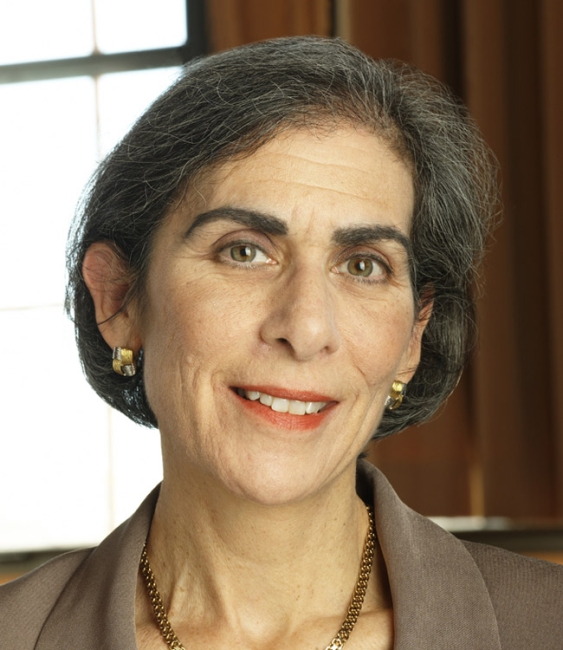You have /5 articles left.
Sign up for a free account or log in.

Amy Wax
University of Pennsylvania
“Jonathan, you may know by now that Penn has begun the formal process of sanctioning me, including stripping me of tenure and firing me. Penn’s effort is based solely on my speech and opinions … and is part of a bold attempt to purge the ‘unwoke’ from the academy. This is serious, and Penn is seeing what they can get away with. Penn is not a forum in which dissenting views are welcome. Rather, they are penalized.
“Also, if you could tweet about my case … or speak out about it, or write an op ed about it, that would be great! I know you are a free expression advocate, and against cancellation. Now is the time to stand up and be counted!
“Best and thank you. Amy.”
* * *
Amy is Amy Wax, of course, the much-reviled law professor at the University of Pennsylvania. Last month Wax’s dean sent a 12-page letter to the university’s Faculty Senate, asking it to review Wax’s conduct and to impose a “major sanction” against her. The letter cited Wax’s “intentional and incessant racist, sexist, xenophobic, and homophobic actions and statements.” And last week Wax’s email popped into my inbox, under a telling tagline: “Penn vs. Wax.”
For the record, I have met Wax exactly once and have emailed with her a handful of times. But I also teach at Penn and—as Wax noted—I am a zealous advocate of free speech. I’ve editorialized in support of Wax’s right to say what she thinks, even when I believed she was spreading disproven racial and ethnic stereotypes. I was—and remain—outraged by some of her statements. But the best response to Wax is to raise our voices, I maintained, not to stamp out hers. Censoring Wax makes her into a free speech martyr in the dark world of white supremacy, which thrives on victimhood. And it also makes good-faith critiques of liberal social policies less likely, because people who oppose those policies will fear getting censored themselves.
Yet the letter about Wax from the Penn law school dean, Theodore W. Ruger, includes new information about Wax’s personal behavior, which is a different matter. Professors should be free to support any political party or position they want without fear of being penalized by their institutions. But their own position as professors also gives them a special duty to treat students and colleagues with decency and civility.
If the charges in Ruger’s letter are correct, Wax violated that duty. Wax allegedly told a Black student that the only reason the student was admitted to two Ivy League universities was “because of affirmative action.” According to Ruger’s letter, she told an openly gay colleague that “same sex relationships are self-centered, selfish, and not focused on family or community.” And after several students with foreign-sounding names introduced themselves, she reportedly exulted when another student presented with a more familiar name. “Finally, an American,” she allegedly said. “It’s a good thing, trust me.”
Wax should be free to oppose affirmative action, same-sex marriage and immigration. Those are publicly debated issues, and we can’t learn more about them—or help the public understand them—if we can’t debate them ourselves, in a full and open manner. That’s why I’ll continue to defend Wax’s right to express “dissenting views,” as she wrote in her email, even when I find them bigoted and repulsive.
But Wax has no right—none—to demean or abuse specific individuals in her professional orbit. Saying affirmative action leads to the admission of unqualified students is one thing; telling a specific student that she was unqualified is another. Likewise, it should be OK to argue for restrictions on immigration to America. But it’s not OK to tell immigrants or international students that they’re less valued than native-born Americans. That’s a gratuitous slur, not a political statement, and it has no place in a university classroom.
That’s why the 1915 Declaration of Principles of the American Association of University Professors—the founding document of modern academic freedom—insisted that freedom must never be a cover for inept or inappropriate conduct. Academic freedom “in no sense” allows faculty members to “be exempt from all restraints as to the matter or manner of their utterances,” the declaration warned. To the contrary, it urged faculties to “purge” their “incompetent” colleagues, via careful procedures involving judicial committees selected by faculty leadership bodies or the faculty at large.
Otherwise, academic freedom can be used—and abused—to justify anything a professor does, no matter how abhorrent. Academic freedom does not allow you to mock or disparage your students. It does not allow you to evaluate them based on their looks or on whether they will sleep with you. It does not allow you to harass or threaten colleagues.
And, most of all, it does not—or should not—let you teach poorly. I recently wrote a book on the history of college teaching, focused especially on campaigns to improve it over time. At every turn, professors invoked academic freedom to resist any effort to monitor or evaluate their instruction. A University of Chicago dean noted glumly in 1910 that in the minds of most faculty members, “the University ideal of academic freedom seems to be violated when a supervisor enters a man’s classroom.”
That was five years before the AAUP’s declaration, which sought to differentiate politics (which we should protect) from incompetence (which we shouldn’t). But across the ensuing century, my research found, badly performing teachers continued to rely on academic freedom “as a blanket defense,” as two professors wrote in 1955. Forty years later, two other scholars observed, little had changed; faculty still insisted that academic freedom means “my right to do what I want in my class.”
It doesn’t, of course. Wax’s reported behavior was cruel and incongruous with her responsibilities as a faculty member. The university would be within its rights to sanction her for it.
But it must never penalize her for her political beliefs. And it’s certainly reasonable to ask whether Penn is using her in-class behavior as a proxy to punish her for them. Dean Ruger’s letter to the Faculty Senate repeatedly took Wax to task for her “public statements” about race and gender, which—like her classroom conduct—inflicted “harm” on students and colleagues, Ruger charged. “Wax’s pervasive and derogatory racism and sexism expressed in public statements, taken together with her behavior in the classroom, leads reasonable students to conclude that they will be judged and evaluated based on their race, ethnicity, gender, national status, or sexual orientation rather than on their academic performance and ‘true merit,’” he wrote.
Yet we must strive to keep Wax’s public statements and her alleged classroom behavior separate, as best we can. I realize that minority students, especially, might have felt equally threatened by her personal and public remarks. But if we sanction her political claims for causing “harm,” almost any speech can be censored on the same grounds. Pro-life students will say they were harmed by pro-choice students, and vice versa; faculty supporting gun rights will be muzzled for making others feel unsafe; anyone opposing trans athletes on women’s teams (a hotly contested question at Penn) will be disciplined for threatening sexual minorities. And academic freedom will be a dead letter.
It’s already hanging by a thread. Numerous state legislatures have considered or passed bills barring instruction in K-12 schools—and, increasingly, in college classrooms—about allegedly “divisive concepts” like critical race theory and “The 1619 Project.” False-equivalence alert: I do not think these curricula and Wax’s statements around race are the same. But other people will equate them, which is the whole point here. Once we decide that her political statements are too dangerous (sorry, “divisive”!) to be freely expressed, we won’t have a leg to stand on when lawmakers try to censor other ones.
I understand—and in some ways, share—the temptation to fire Wax for her public comments about race and gender. Why should a tenured professor be allowed to say that people of color litter more, that Asians don’t appreciate liberty and that Black people have “different average IQs” than non-Blacks? Here’s why: because we don’t want a university where everyone is looking over their shoulders, wondering if what they said could end their careers. If Wax is dismissed, how many people will feel free to criticize affirmative action when it comes before the Supreme Court in the fall? You might reply that such people are racist, so it’s a good thing when they bite their tongues. And then you will have proven Wax’s point: the entire goal here is to purge dissenting opinions. I don’t want her to be right about that. Do you?
* * *
Dear Amy,
Thanks very much for your kind message. I share your concern about the suppression of dissent in the academy, of course. And insofar as the current attack on you aims to punish you for your “speech and opinions,” as you write, I’m firmly and unequivocally opposed to it. You should have the full right to express those views, especially at a moment when academic freedom is under enormous strain and challenge across the country. I’ll never stop defending that.
But Dean Ruger’s letter also describes workplace behavior on your part that is—quite simply—indefensible. I wasn’t present for any of these episodes, and I realize that they can be distorted during the investigatory process. But if your comments to students and colleagues are reported accurately, I believe they lie outside the bounds of proper professional conduct.
So I plan to write a column that supports your right to speak your mind, under the umbrella of academic freedom, but also argues that some of your alleged behavior should not be protected by it. Now is indeed the time to be counted, as you note. And I want to be counted as someone who never strayed from his commitment to open, unfettered expression—and to civil, reasoned discourse—in the American academy. We need both, right now, and more than ever before.
I’m sure this must be an incredibly stressful time, for you and your family. I hope the next steps bring you health, and hope, and peace.
Fondly, JZ








